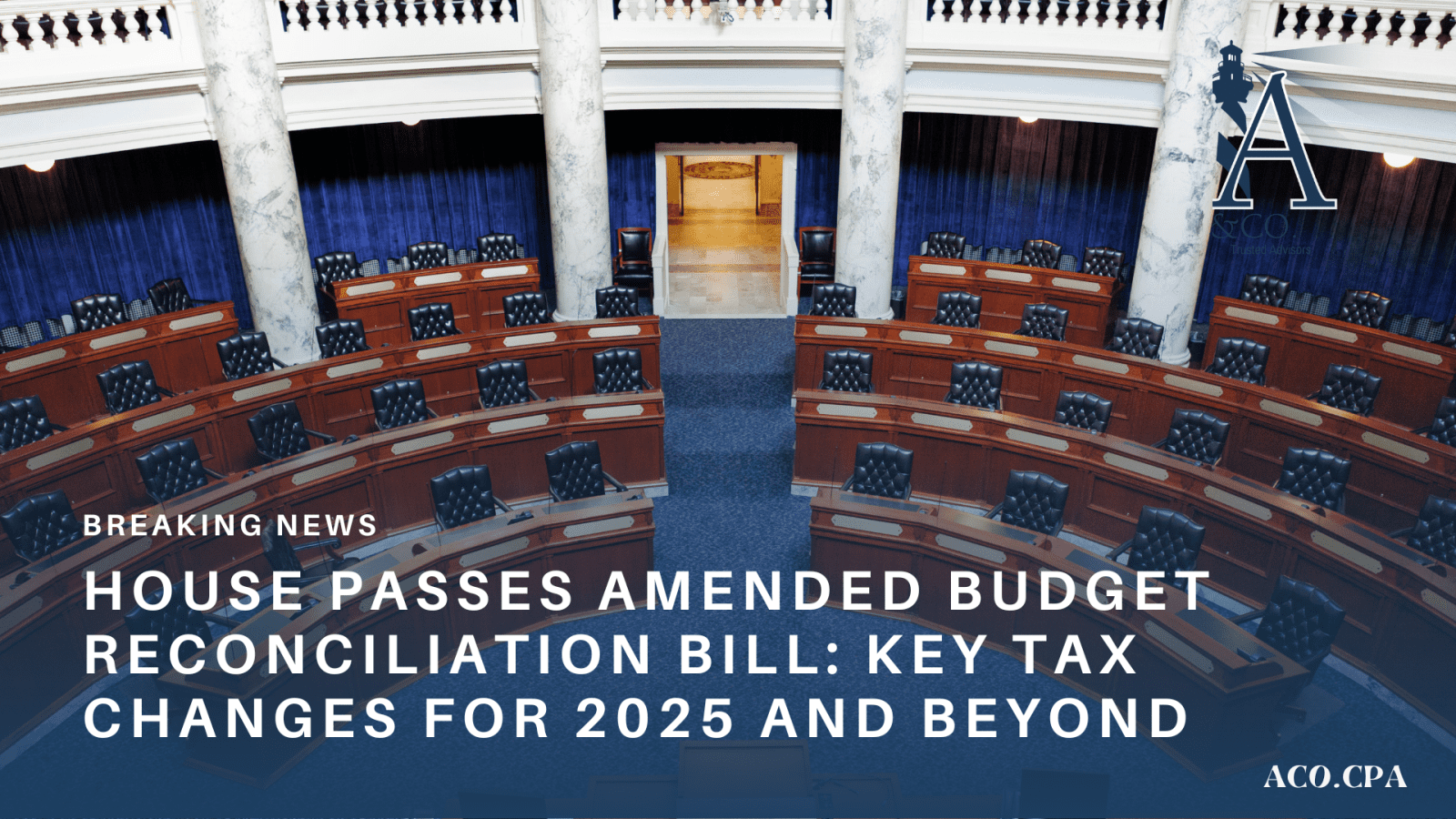Accavallo & Company CPAs | May 27, 2025
On Thursday, the U.S. House of Representatives narrowly passed an amended version of the budget reconciliation bill, officially titled the One Big Beautiful Bill Act (H.R. 1). The bill now moves to the Senate for further consideration. The final House vote came in at 215-214, with one member voting present, following extended deliberations and last-minute negotiations.
For taxpayers and business owners, the bill introduces a number of significant tax provisions. Below, Accavallo & Company CPAs outlines the most important updates and what they could mean for clients heading into 2025 and beyond.
State and Local Tax (SALT) Cap Increased
One of the most closely watched changes involves the federal deduction limit for state and local taxes. The bill increases the SALT deduction cap to \$40,000 per household (\$20,000 for married taxpayers filing separately), beginning in tax year 2025. This represents a significant increase from the current \$10,000 cap. However, the benefit will phase out for taxpayers with modified adjusted gross income (MAGI) over \$500,000 (\$250,000 for separate filers). From 2026 through 2033, these thresholds will increase by 1% annually, remaining fixed thereafter.
Importantly, the bill does not extend SALT deductibility to specified service trades or businesses (SSTBs) via passthrough entity taxes (PTETs). Despite calls from the AICPA to allow SSTBs to deduct SALT under PTET regimes, this change was not adopted.
Itemized Deduction Limitations Modified
The bill eliminates the Pease limitation (IRC §68) on itemized deductions but introduces a complex new two-pronged formula for high-income taxpayers. The amount of itemized deductions will now be reduced depending on the taxpayer’s income relative to the 37% tax bracket threshold and the amount of allowable state and local tax deductions. Clients affected by this change should consult with us to model the impact on their 2025 returns.
Changes to Business Loss Treatment
For noncorporate taxpayers, the treatment of excess business losses is revised. Rather than converting to net operating losses (NOLs), excess business losses will now carry forward as excess business losses under §461(l)(2). This could delay or prevent the utilization of certain losses, affecting tax planning for sole proprietors and partnerships.
Foreign Income Deductions Adjusted
The bill slightly rolls back reductions scheduled under the Tax Cuts and Jobs Act (TCJA) for international tax deductions:
The foreign-derived intangible income (FDII) deduction will be 36.5% (up from the TCJA-scheduled 21.875%).
The global intangible low-taxed income (GILTI) deduction is set at 49.2% (instead of the scheduled 37.5%).
These modest increases provide partial relief for multinational taxpayers and corporations engaged in global operations.
Contingent Fee Provision Retained
Despite objections from the AICPA, the bill includes language that prevents Treasury from restricting the use of contingent fees in the preparation of tax returns or refund claims. This could impact ethical standards in tax preparation and potentially increase the risk of abuse.
Clean Energy Credits and Leasing Restrictions
While the bill promotes clean energy, the manager’s amendment tightens eligibility for key tax incentives:
- A faster phaseout of low-carbon electricity production credits is now in place.
- New construction must start within 60 days of enactment and be placed in service by year-end 2028.
- Wind and solar leasing arrangements are no longer eligible for Sec. 45Y and 48E credits, potentially affecting investment decisions in the renewable energy space.
Other Notable Provisions
- “MAGA” savings accounts for children have been rebranded as “Trump accounts.”
- Silencers are removed from the definition of “firearm” under the Internal Revenue Code, with the related transfer tax reduced to zero.
- The BEAT tax increase scheduled for 2026 has been replaced with a smaller increase to 10.1%, instead of the original 12.5%.
Legislative Process and Next Steps
The House Rules Committee waived a rule requiring a supermajority vote for income tax increases, allowing the bill to proceed with a simple majority. The Senate is expected to consider the bill in the coming weeks, and additional changes may still occur.
Planning Ahead
At Accavallo & Company CPAs, we are closely monitoring this legislation and its potential impacts on our clients. These changes, if enacted, could significantly alter tax planning strategies for individuals, families, and businesses alike. We encourage clients to contact our office to discuss how these developments may affect their 2025 tax outlook and to begin proactive planning now.
For questions or to schedule a consultation, please reach out to your Accavallo and Company advisor or email us at [email protected].



